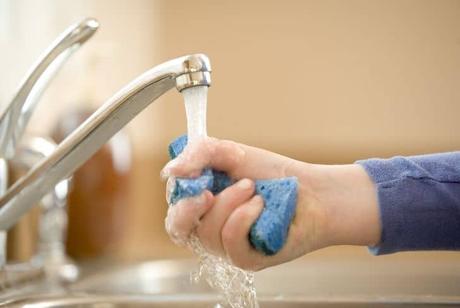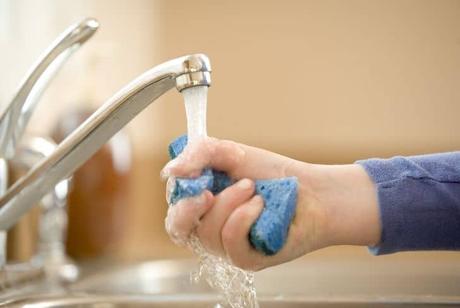Are Sponges Recyclable?
The first thing that comes to your mind when you talk about sponges will range from taking your bath in the bathroom to washing your dishes in the kitchen. No doubt, sponges are highly invaluable in the home due to their numerous uses. When you talk about cleaning your footwear, washing your dishes, getting dirt off surfaces of home equipment and furniture, the use of sponges cannot be overestimated.
But then, despite their great use, there are still some tough questions we need to ask. For instance, when you use these materials, what do you do with them? Do you think they serve any purpose after you might have used them for home cleaning? After using it to wash your body, do you just throw it away and get your environment littered with it? Are there not several measures you can take to avoid getting your surroundings messed up with these items?

These and many more environmentally-inclined questions on sponges are what we consider in this post. Hence, we answer the questions of whether you can recycle sponges and if your sponges are biodegradable? We will also consider if your sponges are compostable and if they are bad for the environment. Lastly, since we cherish our environment, we will be taking a closer look at how you can dispose of your old sponges.
As you can see, you are about to be exposed to several things you have no or little knowledge of as far as sponges are concerned. What we simply ask of you is to take a sit back and follow through as we provide answers to these frequently asked questions about sponges.
Can You Recycle Sponges?
This is one of the most asked questions about sponges. The answer to this question is not far-fetched. In the subsequent paragraphs, you will get to know the answer to this pressing question.
Yes, you can recycle sponges. However, it is important that you know that not all types of sponges are recyclable. While some types of sponges can undergo recycling processes, others cannot. Do you want to know the reason for this? We trust you do. So here you have it.
The reason is simply that sponges are made from different materials. While some are made from polyurethane, others are made from plant sources as well as cellulose. These different materials affect the possibility of having each one recycled. But then, as a user, you would like to know which of the sponges are recyclable. Well, here you have it.
Research has shown that sponges made from cellulose and plant sources can be recycled. This is because they are made from natural elements and for that reason, can go through recycling processes with ease. The cellulose sponges are made from a combination of natural and veggie-based materials such as cotton fibers and wood pulps which make them highly recyclable.
Due to the presence of these natural fibers and cellulose in large quantities in them, they can be recycled after their useful life. The plastic types of these sponges, that is, those made from cellulose but are plastic can also be recycled and used to make other plastic materials.
On the other hand, sponges made from polyurethane are generally not recyclable because they contain a high amount of petroleum-based materials which makes their recycling impossible. Recycling stations often exclude this kind of sponges from their acceptable recyclable materials.
Are Sponges Biodegradable?
It is natural for you to want to know if what you use daily to bathe and wash dishes are biodegradable or not. Well, you have come to the right place, you don’t need to think too far about it, in the subsequent paragraphs, we provide you with the answers you need.
Whether sponges are biodegradable or not depends on their type. As mentioned earlier, sponges are of two types – those made from natural materials such as cotton fibers and wood pulps (generally referred to as cellulose sponges) and those made from petroleum-based materials (usually referred to as polyurethane sponges). Accordingly, the former are biodegradable while the latter is not.
Cellulose sponges are biodegradable due to a large number of natural elements and materials from which they are made. Naturally, this type of sponges can decompose due to their natural composition. Since they are veggie-based, that is, they are made from plants and vegetables, they can easily be broken down.
Another evidence to show that cellulose sponges are biodegradable is due to the wear and tear associated with them. As you wash and scrub your dishes or whatever you are using it to wash, you will notice some scratches which are a result of wear and tear. This proves their volatility state and the potentials of quickly breaking down after some time. But then, this is just for one type of sponges, the other type is not like this.
The polyurethane sponges on the other hand are not biodegradable. This is because of the fact that they are made from petroleum-based materials. This makes them look so much like nylon or polyester. And since these materials are non-biodegradable, it is easier to conclude that polyurethane sponges are not biodegradable.
Moreover, these types of sponges can also be made from renewable sources such as gas and oil which thicken their texture. This is the reason you are likely to see them in landfills for several years without breaking down. And this is why it has been recommended that the polyurethane sponges should be properly disposed of to prevent them from posing threat to our environment and surrounding.
Are Sponges Compostable?
Here is another question you will like to find an answer to. To know if sponges are compostable or not, it is important that we know the peculiarity of each type of sponges. You are already familiar with the different types of sponges, now, let’s look at which of them can be broken down to form compost.
Generally, polyurethane sponges are not compostable. Due to their composition, they lack the ability to be broken down to form compost. Most of the polyurethane sponges are made from petrochemical as well as synthetic materials. Due to a large amount of these petroleum materials, they often emit formaldehyde, a substance that prevents them from decaying. The emission of this gas from these sponges makes them not compostable.
On the other hand, are cellulose made sponges compostable? Your guess is as good as mine. Due to the natural materials from which these types of sponges are made, they are highly compostable. They are made from cotton fibers and wood pulps. Due to this composition, they easily decay and form compost. This is the reason you necessarily do not need to throw them away once you are done using them. You can use them to form compost.
Subsequently, you can choose to soak these sponges in chemical solutions before composting. Why do you need to do this? This is in order to aid the growth of bacteria. These bacteria will aid the decomposition of the sponges and within a short period of time, compost is formed.
From the above explanation, it is obvious that the cellulose sponges unlike the polyurethane sponges are compostable due to the large number of natural materials from which they are made. So, don’t be afraid to toss your cellulose sponges in the recycling bin.
Are Sponges Bad For The Environment?
The environment is very important to all of us. This is why we need to guard it jealously, and doing this would require that we know the things capable of harming the environment so that we can eliminate them or reduce their use.
For sponges, despite their several uses in the home, these materials come with a lot of threats and environmental hazards. These sponges, especially the polyurethane sponges are not good for human health as well as the planet. They pose a lot of threats to human existence.
The first thing that comes with sponges is the high amount of waste that they form. Due to the fact that they are commonly used in every house across the globe, these items are great sources of wastes, not just in America but across the globe.
A large amount of them is thrown away daily and are left to remain in the landfill for many years as possible, and this poses a serious threat to our health and environment. For instance, due to the lightweight of these sponges, they can be blown away or washed by the flood to the sea. Here, they pose pollution risk to the waters and health risk to the aquatic animals in there.
How Do You Dispose of Old Sponges?
Sponges require proper disposal since they may be hazardous to our health and the environment. It is important that we dispose them of so as to make our environment habitable.
After using your sponge for a specific period of time and it’s now time to throw it away, you should endeavor to dispose of it safely in your refuse bin. Throwing it out to the environment can release some dangerous chemicals which are harmful to your health as well as to your resources. This is more associated with the polyurethane type of sponges. What you can do is put them in a paper or plastic bag and tie them before tossing them in the trash can.
On second thought, instead of throwing these hazardous materials into the environment, you can reuse them for several purposes. This will limit the risk of making your environment unhealthy and unfriendly. Let’s look at some says of reusing sponges in the paragraph below.
4 Amazing Ways To Reuse Old Sponges
The fulfillment that comes with reusing an old thing is one of the best feelings you can have. Sponges can be reused for several purposes. However, before you use it, it is necessary that you remove every trace of detergent and chemical in it. After this, you can use the old sponge for different creative things. Some of these things include
1. Make A Laptop Case Bag
Yes, you can make a laptop case bag from your old sponges. But then, how do you go about making this? The process is quite simple. All you need to do is to sew two or more sponges together. You can as well staple them together in a rectangular shape with an opening at the top. You can add some spice and sew a zip to the opening. By doing this, you now have a bag to take on your travel.
2. Make A Pouch
Another brilliant thing you can make out of your old sponges is a pouch or purse for your money and other valuables. You can simply do this by joining the sponges together by stitching or sewing. When you do this, you are able to make good use of your old sponges without necessarily throwing them into the landfill and leaving them for years.
3.Use As Water Conserver
Are you thinking of conserving water for your plants and seedlings? You can use your old sponged to conserve water for your plants. You can place the sponges at the bottom of the vase and make them soak with water. You will be able to conserve enough water for your plants and flowers when you do this.
4. Use To Preserve Veggies
In order to make your vegetables and fruit last for a relatively long period of time, you can wrap them in your old sponge before placing them in the refrigerator. This will provide the vegetables and fruits from losing water or moisture.
Conclusion
Sponges are important if you keep them intact. But then, while the cellulose sponges can decompose and are recyclable, the polyurethane sponges are non-biodegradable and are not recyclable. This means that these materials need to be properly disposed of to make the environment healthy and habitable. This way, we are sure that our lives and environment are protected.
Sources:
https://earth911.com/home-garden/recycling-mystery-kitchen-sponges-and-scouring-pads/
https://www.cambridgema.gov/Services/Recycling#!rc-cpage=253103


